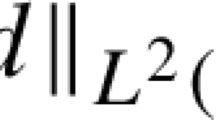Abstract
This work is a continuation of the author’s study of simulation relations between nonlinear input–output systems with disturbances. Previously we derived a criterion under which a “pointwise” simulation condition implies simulation by so-called “admissible” inputs and disturbances (that is, inputs and disturbances that yield time-dependent vector fields satisfying C 1 Carathéodory conditions). This criterion included a certain constant-rank assumption. In this paper we use the theory of set-valued mappings and differential inclusions to derive analogous results in which the constant-rank assumption is replaced by a compactness provision that augments the pointwise simulation condition. We illustrate our simulation results by deriving a sufficient condition for achieving global controlled invariance of a (possibly singular) nonlinear system through the use of a set-valued feedback law.
Similar content being viewed by others
References
Davy JL (1974) Generalized differential equations satisfying Carathéodory type conditions. Thesis, Australian National University
Deimling K (1992) Multivalued differential equations. Walter de Gruyter, Berlin
Grasse KA (1992) On controlled invariance for fully nonlinear systems. Int J Control 56: 1121–1137
Grasse KA (1996) On controlled invariance for a simple class of distributions with singularities. In: Mordukhovich BS, Sussmann HJ(eds) Nonsmooth analysis and geometric methods in deter- ministicr optimal control. Springer, New York, pp 111–128
Grasse KA (2003) Admissibility of trajectories for control systems related by smooth mappings. Math Control Signals Syst 16: 120–140
Grasse KA (2005) Lifting of trajectories of control systems related by smooth mappings. Syst Control Lett 54: 195–205
Grasse KA (2007) Simulation and bisimulation of nonlinear control systems with admissible classes of inputs and disturbances. SIAM J Control Optim 46: 562–584
Grasse KA, Sussmann HJ (1990) Global controllability by nice controls. In: Sussmann HJ(eds) Nonlinear controllability and optimal control. Marcel-Dekker, New York, pp 33–79
Himmelberg CJ (1974) Measurable relations. Fund Math 87: 53–72
Haghverdi E, Tabuada P, Pappas G (2003) Bisimulation relations for dynamical and control systems. Electr Notes Theor Comp Sci 69: 17
Isidori A (1995) Nonlinear control systems, Springer, New York
Isidori A, Krener AJ, Gori-Giorgi C, Monaco S (1981/82) Locally (f, g)-invariant distributions. Syst Control Lett 1:12–15
Nijmeijer H (1981) Controlled invariance for affine control systems. Int J Control 34: 825–833
Nijmeijer H, van der Schaft AJ (1990) Nonlinear dynamical control systems. Springer, New York
Pappas GJ (2003) Bisimilar linear systems. Automatica 39: 2035–2047
Pappas GJ, Simić S (2002) Consistent abstractions of affine control systems. IEEE Trans Automat Control 47: 745–756
Tabuada P, Pappas GJ (2004) Bisimilar control affine systems. Syst Control Lett 52: 49–58
Tabuada P, Pappas GJ (2005) Quotients of fully nonlinear control systems. SIAM J Control Optim 43: 1844–1866
Tabuada P, Pappas GJ (preprint) Hierarchical trajectory generation for a class of nonlinear systems.
van der Schaft AJ (2004) Bisimulation of dynamical systems. In: Hybrid systems: computation and control: 7th international workshop, HSCC 2004, Philadelphia, March 25–27, 2004. Lecture Notes in Computer Science, vol 2993. Springer, Heidelberg, pp 555–569
van der Schaft AJ (2005) Equivalence of dynamical systems by bisimulation. IEEE Trans Automat Control 50: 286–298
Warner FW (1971) Foundations of Differentiable Manifolds and Lie Groups. Scott, Foresman and Company, Glenview
Author information
Authors and Affiliations
Corresponding author
Rights and permissions
About this article
Cite this article
Grasse, K.A. Admissible simulation relations, set-valued feedback, and controlled invariance. Math. Control Signals Syst. 20, 199–226 (2008). https://doi.org/10.1007/s00498-008-0030-3
Received:
Accepted:
Published:
Issue Date:
DOI: https://doi.org/10.1007/s00498-008-0030-3




